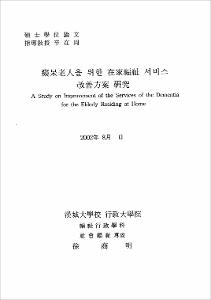癡매老人을 위한 在家복지 서비스 改善方案 硏究
- Files in This Item:
-
-
Download
 000000066119.pdf
기타 데이터 / 2.92 MB / Adobe PDF
000000066119.pdf
기타 데이터 / 2.92 MB / Adobe PDF
-
Items in Repository are protected by copyright, with all rights reserved, unless otherwise indicated.
 000000066119.pdf
기타 데이터 / 2.92 MB / Adobe PDF
000000066119.pdf
기타 데이터 / 2.92 MB / Adobe PDFItems in Repository are protected by copyright, with all rights reserved, unless otherwise indicated.